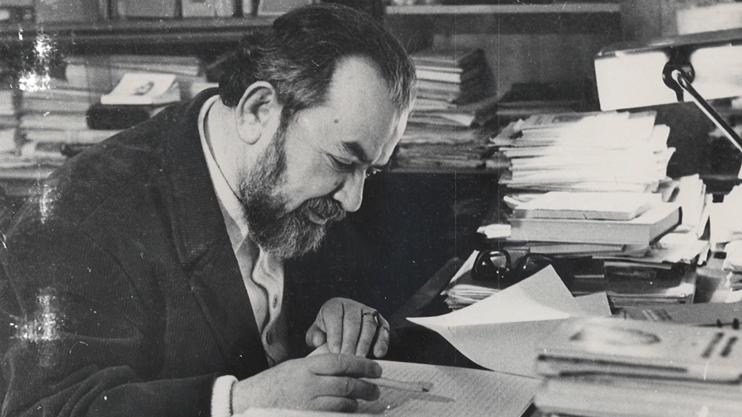This year is the hundredth birth anniversary of Gevorg Emin, one of the fine names of the poetry of Armenia in the second half of the past century, along with Hamo Sahian, Hovhannes Shiraz, Silva Kaputikian, Hrachia Hovhannisian, and especially Paruyr Sevak, who took the mantle after the death of Yeghishe Charents during the Stalinist purges.
He was born Gevorg Muratian on September 30, 1919, in the town of Ashtarak. He was forced to adopt the name Karlen in the 1930s, at a time when there was the so-called “Communist baptisms.” In 1940 he graduated from the school of Hydrotechnics of the Polytechnic Institute “Karl Marx” of Yerevan (now the State Engineering University of Armenia). However, he soon shifted to literature and in the same year published his first book of poetry, Initial Path, in 1940, which he signed Gevorg Emin. He worked from 1940-1942 at the Matenadaran and in the district of Vardenis. He was wounded during his participation in World War II from 1942-1944.
Emin went to study at the studio of Armenian writers, which was attached to the Literary Institute of Moscow, from 1949-1950. He returned to Armenia and became the Yerevan correspondent of the Moscow literary weekly Literaturnaya Gazeta (1951-1954). In 1951 he won the State Prize of the Soviet Union for his collection New Road, published two years before. In 1954 he was back to the Soviet capital and studied until 1956 in the higher literary courses adjunct to the Writers Union of the Soviet Union.
In the Stalin years, Emin had started finding his own voice amid ideological restraints and criticism. His poetry, where the reflections on humanity, his people, and the homeland were matched with a more free style in composition, gained critical attention from the 1960s. Between 1968 and 1972 he was the editor in chief of the monthly Literaturnaya Armenia, published by the Writers Union of Armenia in Russian. Afterwards, he entered the Institute of Art of the Academy of Sciences as a senior researcher. In 1976 he won the State Prize of the Soviet Union for the second time after the publication of his book Land, Love, Century, and in 1979 he won the prize “Charents” in Armenia.
Besides a steady flow of poetry, published in some two dozen books, Emin was also a prolific author of essays, which were collected in several volumes, including Seven Songs about Armenia (1974), the most popular. The latter was derived from his script for the homonymous film, shot in 1967 by Grigor Melik-Avakian, which earned prizes in festivals in Yerevan and Leningrad (St. Petersburg). He was a prolific translator and gathered his best works in Book of Translations (1984). At the same time, his poetry was translated into many languages, including English (Land, Love, and Century, 1988).
Gevorg Emin was always a non-conformist writer, and his essays published in the twilight of the Soviet regime and in the first years of independence brought new elements to understand the immediate past. He passed away on June 11, 1998, at the age of seventy-eight.
